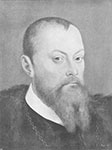Maurice of Saxony
|
 |
born March 21, 1521, Freiberg, Saxony
died July 9, 1553, Sievershausen, Saxony
Duke (1541–53) and later elector (1547–53) of Saxony, whose clever manipulation of alliances and disputes gained the Albertine branch of the Wettin dynasty extensive lands and the electoral dignity.
Maurice succeeded his father, Duke Henry of Saxony, in 1541. Although a Protestant, he aided the Roman Catholic emperor Charles V against the Turks (1542), Cleve (1543), and France (1544). In 1545, he was dissuaded from supporting the Lutheran Schmalkaldic League by an imperial promise of the Saxon electorship, held by Johann Friedrich (1503-1554) the Magnanimous of the rival Ernestine branch of the Wettin dynasty; Maurice returned to Charles's camp and conquered electoral Saxony. Ousted in 1547, he returned after John Frederick's defeat in the Battle of Mühlberg (April 24, 1547) and received the electoral dignity and sizable lands.
Soon, however, Maurice began to resent Charles's plans to reintroduce Catholicism in Germany's Protestant territories and the continued imprisonment of his father-in-law, Philip the Magnanimous, landgrave of Hessen, whose freedom Charles had guaranteed. Commissioned to capture the rebellious Lutheran city of Magdeburg (1550), Maurice seized the occasion to raise an army and signed anti-Habsburg compacts with France and Germany's Protestant princes. In March 1552 the rebels overran southern Germany and parts of Austria, forcing the Emperor to flee and release Philip. In August 1552 the Lutheran position was provisionally guaranteed by the Treaty of Passau. Again returning to the Emperor's camp, Maurice campaigned against the Turks in Hungary. Finally, in northwestern Germany, he confronted his former ally Albert II Alcibiades of Brandenburg, who had rejected the Passau armistice. He defeated Albert at Sievershausen but was himself killed in the battle.
Copyright © 1994-2002 Encyclopædia Britannica, Inc.
![]()
Sources
- Encylopedia Britannica 2002, Expanded Edition DVD
Web





